
Official Edgar Rice Burroughs Tribute and Weekly Webzine Site
Since 1996 ~ Over 15,000 Webpages in Archive
Volume 0950

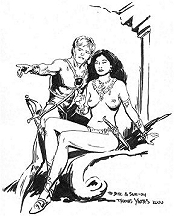 |
ERBapa v02 n07 by Bill Hillman BILL HILLMAN
|
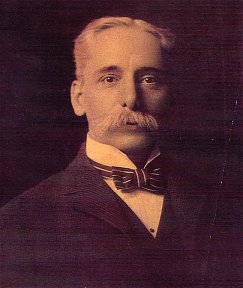
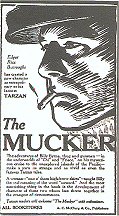
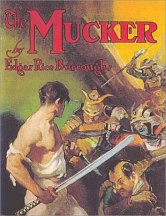
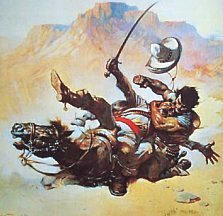
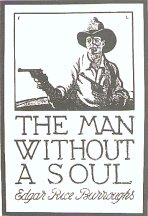
The title of Henry Herbert Knibb's poem, Out There Somewhere, was ERB’s original title for Part II of The Mucker, written in 1916. A prominent feature of this story was the educated vagabond named Bridge, who was continually breaking into verse with affectionate odes to the open road. Almost everything that is quoted by Bridge in The Mucker comes from the same Knibbs poem. Knibbs, born in 1874, was a Canadian-born contemporary of Burroughs, and it is clearly apparent that ERB was much taken by his verse. It was published in 1914 by the Houghton Mifflin Co. as part of a collection called Songs of the Outlands: Ballads of the Hoboes and Other Verse.
THE POEM THAT INSPIRED THE MUCKER
There is every indication that ERB actually was inspired to use his poem as a framework around which to build his story. “Out There Somewhere” has fourteen stanzas and Burroughs took them individually (not in their original order) and quoted no less than eleven of them all through the story. Stanzas 2 and 3, which ERB did not quote, appear to be the source for the character of Bridge. In addition to this, he used the last stanza to end the book, thus linking the conclusions of both works.Through Bridge Burroughs paid a compliment not only to Knibbs but to some of his other favourite authors as well. Bridge also quoted Rudyard Kipling and Robert Service. In fact, the name "Bridge" could well be a pseudonym. In explaining how he came by the name Bridge says that it was "just a name a fellow gave me once up on the Yukon. I used to use a few words he'd never heard before, so he called me 'The Unabridged,' which was too long. The fellows shortened it to 'Bridge' and it stuck." He gives his full name as "L. Bridge." It is not much of a stretch to come to the conclusion that this poetry-quoting hobo from the Yukon could be Jack London. London was one of the few writers whom ERB admitted admiring. Soon after London's death in 1916 Burroughs even offered to write his biography.
It has been said that ERB also put much of himself into the character Bridge in The Mucker, and it has been speculated by some that for the use of Knibbs' verse in his books -- i.e. The Mucker and The Oakdale Affair -- ERB returned the favour by doing some writing for Knibbs. It is known that Burroughs went so far as to contact Knibbs in Los Angeles on October 18, 1916, a few months after Return of the Mucker (Out There Somewhere) appeared in All-Story Weekly (June 17 through July 15, 1916). The first hardcover publication of this sequel was by Methuen (London) in 1922. It appeared in England under the confusing name The Man Without A Soul which was the original magazine title (All-Story, November 1913) for The Monster Men.
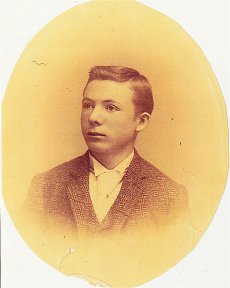
Copyright 2005: Knibbs Family Archive ~ Not for download or distribution
Henry Herbert Knibbs as a Young Man
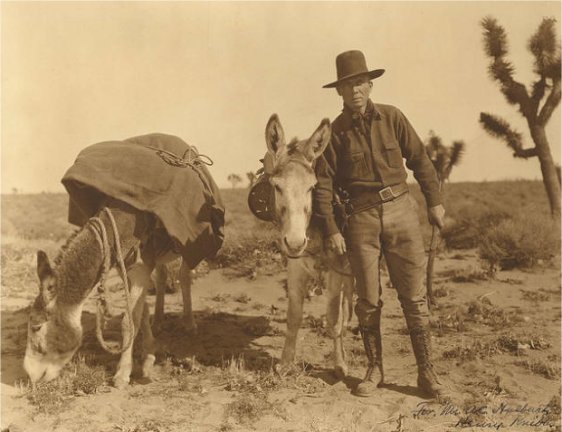
The Trail-Makers by Henry Herbert Knibbs
North and west along the coast among the misty
islands,
Sullen in the grip of night and smiling in the
day:
Nunivak and Akutan, with Nome against the highlands,
On we drove with plated prow agleam with frozen
spray.
Loud we sang adventuring and lustily we jested;
Quarreled, fought, and then forgot the taunt,
the blow, the jeers;
Named a friend and clasped a hand—a compact sealed,
attested;
Shared tobacco, yarns, and drink, and planned
surpassing years.
Then—the snow that locked the trail where famine's
shadow followed
Out across the blinding white and through the
stabbing cold,
Past tents along the tundra over faces blotched
and hollowed;
Toothless mouths that babbled foolish songs of
hidden gold.
Wisdom, lacking sinews for the toil, gave over trying;
Fools, with thews of iron, blundered on and won
the fight;
Weaklings drifted homeward; else they tarried—worse
than dying—
With the painted lips and wastrels on the edges
of the night.
Berries of the saskatoon were ripening and falling;
Flowers decked the barren with its timber scant
and low;
All along the river-trail were many voices calling,
And e'en the whimpering Malemutes they heard—and
whined to go.
Eyelids seared with fire and ice and frosted parka-edges;
Firelight like a spray of blood on faces lean
and brown;
Shifting shadows of the pines across our loaded
sledges,
And far behind the fading trail, the lights and
lures of town.
So we played the bitter game nor asked for praise
or pity:
Wind and wolf they found the bones that blazed
out lonely trails....
Where a dozen shacks were set, to-day there blooms
a city;
Now where once was empty blue, there pass a thousand
sails.
Scarce a peak that does not mark the grave of those
who perished
Nameless, lost to lips of men who followed, gleaning
fame
From the soundless triumph of adventurers who cherished
Naught above the glory of a chance to play the
game.
Half the toil—and we had won to wealth in other
station;
Rusted out as useless ere our worth was tried
and known.
But the Hand that made us caught us up and hewed
a nation
From the frozen fastness that so long was His
alone.
.
. . .
. .
Loud we sang adventuring and lustily we jested;
Quarreled, fought, and then forgot the taunt,
the blow, the jeers;
Sinned and slaved and vanished—we, the giant-men
who wrested
Truth from out a dream wherein we planned surpassing
years.
HENRY HERBERT
KNIBBS (1874 - 1945)
Cowboy Poet and Author
"... Forest enchanted, filled with magic dreams."
Henry Herbert Knibbs
Henry Herbert Knibbs 1874 - 1945 was born in Clifton (Niagara Falls), Ontario, Canada to affluent American parents. His biography record at Los Angeles Library states that his ancestors were Cornish tin miners, seamen and Long Island farmers.He was encouraged to read the works of Longfellow, Lord Byron, Whittier, Tennyson, Edgar Allen Poe while developing a love for the fiddle and its music. His introduction to horses and livestock on his grandparents' farm in Pennsylvania stuck with him throughout his life.
He never graduated from college but attended Woodstock College at age 14, then Bishop Ridley College for three years and studied English at Harvard. He moved to California in 1901 where he wrote his first Novel, Lost Farm Camp. Most of Knibbs' novels are set in the West and in revolutionary Mexico.
Knibbs' poetry books include, First Poems, 1908 ~ Songs of the Outlands, Ballads of the Hoboes and Other Verse, 1914 ~ Riders of the Stars: A Book of Western Verse, 1916 ~ Songs of the Trail, 1920 ~ Saddle Songs and Other Verse, 1922 ~ and Songs of the Lost Frontier 1930. He also authored 13 western novels and a series of articles printed in the Saturday Evening Post, Red Cross Magazine, Current Opinion, West, Western Stories and Adventure.
Henry Herbert Knibbs was a scholar who aspired to be a Western writer and poet. There is no doubt that he put a great deal of research and thought into his writing. He was not born into ranch life, but became a Western writer through his great efforts. As a result, he left a legacy of profound cowboy poetry for our pleasure.Knibbs spent his last few years as owner/operator of a violin shop in Banning, California. His self-biography, A Boy I Knew remains unpublished.
First Poems, 1908
HENRY HERBERT KNIBBS BIBLIOGRAPHY
See the ERB Personal Library Project
Shelf K2
Songs of the Outlands: Ballads of the Hoboes and Other Verse. Boston: Houghton Mifflin Co., 1914
The Ridin' Kid from Power River. Illustrated by R. M. Brinkerhoff. Grosset & Dunlap
Sundown Slim. Illustrated by Anton Fischer. Boston & New York, Houghton Mifflin Co. 1915 356p
Christened Washington Hicks, the homely six-foot-four hobo-cook-cowboy-philosopher
preferred to be called Sundown Slim. As a frontier character he anticipates Will Rogers in this good yarn of
humor, virtue rewarded, and cattle-sheep strife in a central Arizona setting.
Riders of the Stars: A Book of Western Verse. Boston: Houghton Mifflin Co., 1916.
Tang of Life. Illustrated by E. Boyd Smith. Houghton Mifflin Co., 1918.
Songs of the Trail. Illustrated by Harold Cue. Boston: Houghton Mifflin Co., 1920.
Partners of chance. New York: Grosset & Dunlap, 1921. 231 p.
Partners of chance. Boston: Houghton Mifflin, 1921. 231 p. NMSU
Partners of chance. London: Hutchinson, 1921? 286 p.
Saddle Songs and Other Verse. Boston: Houghton Mifflin Co., 1922.
Songs of the Lost Frontier. Boston: Houghton Mifflin Co., 1930.
The Tonto kid. Boston: Houghton Mifflin, 1936. 269 p.
The Tonto kid. New York: Bantam, 1946. 218 p.
Cowboy Poetry Classic Rhymes by HHK. Cowboy Miner Productions, 1999. 208 p.
ONLINE REFERENCES FOR KNIBBS AND ERB's THE MUCKER
Jim Waring of Sonora-Town or Tang of Life
Online eText Edition in ERBzine:
www.erbzine.com/craft/hhk.htmlBill Hillman's ERB C.H.A.S.E.R. Online Encyclopedia
http://www.erbzine.com/chaser
C.H.A.S.E.R. Presents THE MUCKER
http://www.erbzine.com/mag7/0757.html
C.H.A.S.E.R. Presents THE OAKDALE AFFAIR ("Bridge and the Oskaloosa Kid)
http://www.erbzine.com/mag7/0765.html
GREAT LITERATURE ONLINE: Features 22 ERB PD Titles
http://www.mostweb.cc/Classics/Burroughs/themucker/
CLASSIC READER: ERB Bio ~ Photo ~ 22 PD Titles
http://www.classicreader.com/booktoc.php/sid.1/bookid.1074/
DOT LIT: THE E BOOK PLACE: 30 titles
http://dotlit.com/books/kelly/TheMucker.lit
PINK MONKEY.COM DIGITAL LIBRARY: PDF Version plus 1,800 Classics
http://www.pinkmonkey.com/dl/library1/digi219.pdf
ENCYCLOPEDIA OF THE SELF: Hypertext Meanings and Commentaries
with ERB biography, portrait, pictures, lesson plans and 28 online books
http://encyclopediaoftheself.com/classic_books_online/tmuck10.htm
PROJECT GUTENBERG: Original Site with 26 titles
http://promo.net/pg/
ftp://ibiblio.org/pub/docs/books/gutenberg/etext95/tmuck10.txt
ftp://ibiblio.org/pub/docs/books/gutenberg/etext95/tmuck10.zip
http://promo.net/cgi-promo/pg/t9.cgi?entry=331&full=yes&ftpsite=ftp://ibiblio.org/pub/docs/books/gutenberg/
UNIVERSITY OF MARYLAND: Alternate Site for Project Gutenberg with 25 titles
http://www2.cddc.vt.edu/gutenberg/etext95/tmuck10.txt
Jerry Schneider's ERBVILLE: Home of ERB PD Titles in PDF
http://www.angelfire.com/zine2/erbville/erbpdf.htm
Mucker soon to appear in pulp and hardcover versions
PLANET DOWNLOAD
http://download.planetnewton.com/download/books/booksadv2.htm
http://download.planetnewton.com/download/books/the-mucker.zip
EPINIONS.COM: READER REVIEWS OF THE MUCKER
http://www.epinions.com/book_mu-3720358
http://fanac.org/fanzines/Fanscient/Fanscient10-10.html
TARAK'S TAKE ON THE MUCKER
http://www.angelfire.com/trek/erbzine2/erbz710.html
OTHER SITES OF INTEREST
http://www.snowcrest.net/bndlstif/inspire.html
http://www.ioa.com/~stanner/knib1.htm
http://www.cowboyminer.com/books.html
http://www.cowboyminer.com/knibbs.html
http://www.angelcitypress.com
http://www.hitchingpostsupply.com/wcpage5.htm
http://redsteagall.safeshopper.com/15/cat15.htm?132
http://www.bartleby.com/104/63.html
http://sfweb.ci.santa-fe.nm.us/sfpl/nmfict3.html
http://sharlot.org/archives/cowlore.html
http://www.guidon.com/zanegrey.html
http://www.oac.cdlib.org/dynaweb/ead/stanford/mss/m0188
http://www.cowboypoetry.com/dochayes.htm
http://freepages.genealogy.rootsweb.com/~knibbetc/page3d.htm#HHK
http://www.hitchingpostsupply.com/wcpages5.htm and http://www.bartleby.com/104/63.html
http://www.trussel.com/books/pseud_k.htmhttp://genforum.genealogy.com/knibbs/messages/74.htmlHenry Herbert Knibbs was born to American parents on October 24, 1874, in Clifton, Ontario (later known as Niagara Falls). He became fascinated by the fiddle and learned to play at an early age. He suffered from a respiratory ailment for most of his life. Knibbs never worked as a cowboy, but he wrote western short stories, novels and poems. His father, George Knibbs, was a bank clerk at Pierce, Howard and Co., Bankers in Niagara Falls, Ontario. Eventually the company failed, casting the family into hard times. Knibbs spent summer vacations at his grandparents' farm in Pennsylvania. On the farm, he developed a love of horses nearly as great as that for his fiddle. Though he never earned a college degree, Knibbs attended Woodstock College and Bishop Ridley College in Ontario and studied English at Harvard. Leaving college, he spent two years hoboing in the American Midwest.
BIOGRAPHYIn 1899, he married Ida Julia Pfeifer and went to work for the railroad in Buffalo, N.Y. In 1910, he moved to California and wrote his first Western novel, Lost Farm Camp. He then left on a long trip through New Mexico, Arizona and California to soak up local color for his writing. In 1929, Knibbs left his wife to live with Turbesé Lummis Fiske. Ida refused to grant him a divorce and wrote him daily begging him to return home. Turbesé, whose father, Charles Lummis, was a Western writer, influenced and edited much of his later work.
Knibbs wrote 13 novels and six books of poems. His novels are out of print and largely forgotten, but his poetry remains popular in cowboy poet circles. Among his best remembered poems are Boomer Johnson and When the Ponies Come to Drink. Seven films made between 1919 and 1930 were based on his stories and novels. Knibbs career as a Western write came to a sudden halt when he mistakenly gave the period of a mare's gestation as nine months in a story published in the Saturday Evening Post. He was crucified by his peers for the mistake. He certainly knew that the correct period was 11 months, but this slip of the pen cost him his writing career, as he was never able to get another piece published. He died in San Diego, California, on May 17, 1945, from respiratory illness.
~ Ref: IMDB
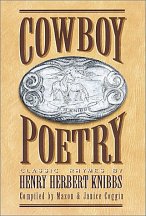 |
Cowboy Poetry Classic Rhymes by Henry Herbert Knibbs
Janice M. Coggin (Editor), H. Mason Coggin (Editor) List Price: $19.95 ~ Hardcover: 208 pages Publisher: Cowboy Miner Productions; ISBN: 0966209117; (July 1, 1999) http://www.cowboyminer.com/books.html Henry Herbert Knibbs was a scholar who aspired to be a Western writer and poet. There is no doubt that he put more research and thought into his writing than either Kiskaddon or Barker. He was not born into ranch life, but became a western writer through his great efforts. As a result he left a legacy of profound cowboy poetry for our pleasure. |
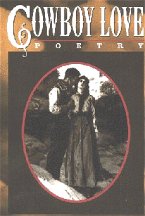 |
COWBOY LOVE POETRY
Verse from the Heart of the West edited by Paddy Calistro, Jack Lamb and Jean Penn; foreword by Waddie Mitchell http://www.angelcitypress.com/cowboy.gif Now in paperback, COWBOY LOVE POETRY, a rare anthology of more than seventy love poems, is written by America's real hero, the cowboy. Read the tender words of classic Western balladeers such as Henry Herbert Knibbs, Frank Desprez, S. Omar Barker, Badger Clark, Belle Starr, Waddie Mitchell, Bruce Kiskaddon, Henry Real Bird, J.B. Allen, Laurie Wagner Buyer and many more. A staple at venues from the Gene Autry Western Heritage Museum to Rizzoli Book Stores, this handsome volume has become an American folk collectible, the only cowboy poetry anthology devoted entirely to romance on the range. |
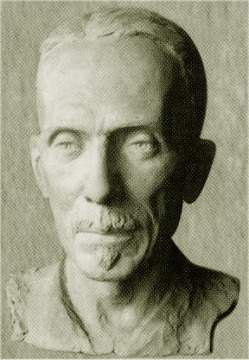
|
|
|
|
|
|
|
|
Correspondence, documents, photographs and sketches, newspaper
clippings, tearsheets, and Knibbs' death mask.
The areas covered include works by Henry Knibbs, including
novels, short stories and poetry;
biographical data on Knibbs; and works by other authors.
![]()
![]()
Volume
0950

WEBJED:
BILL HILLMAN
Visit
our thousands of other sites at:
BILL
AND SUE-ON HILLMAN ECLECTIC STUDIO
All
ERB Images© and Tarzan® are Copyright ERB, Inc.- All Rights Reserved.
All
Original Work © 1996-2002/2004/2018 by Bill Hillman and/or Contributing
Authors/Owners
All
scanned material courtesy ERB Inc. Offices
No
part of this web site may be reproduced without permission from the respective
owners.